
According to TSA checkpoint travel numbers, flights have returned to pre-COVID-19 pandemic highs for fall as compared to 2019. Meanwhile, the Bureau of Labor Statistics reported airline fares have increased by 43% year-over-year for the month of September.
A tough first half of the year due to pilot shortages, delays, flight cancellations and high fuel prices gave airlines no choice but to cut back on how many flights they offered. Airlines have also been selling higher fares in order to cover the high jet fuel prices from the summer.
What does this mean for airlines and other travel providers?
Profiting and Pivoting: Bob Jordan, CEO of Southwest Airlines Co (NYSE:LUV) said “leisure and business demand remains strong, and we currently expect revenue trends to improve sequentially from third quarter to fourth quarter 2022, despite lower capacity.”
In the third quarter, Boeing Co (NYSE:BA) delivered 112 commercial airplanes during the quarter with a backlog that included more than 4,300 airplanes valued at $307 billion. The order backlog of Airbus SE (OTCPK: EADSY) amounted to 7,294 commercial aircraft at the end of September 2022.
More airplane orders are coming in from the majority of the top airlines such as Delta Air Lines, Inc. (NYSE:DAL), United Airlines Holdings Inc (NASDAQ:UAL) and Southwest, which expects its first quarter 2023 flight schedule capacity to increase by approximately 10% and second quarter 2023 capacity to increase by approximately 14%, both year-over-year.
Spirit Airlines Incorporated (NYSE:SAVE) was flying its planes two hours less than usual while Southwest reported it could fly 5% to 8% more, but staffing issues for pilots were impacting all the major airliners, reported by Wall Street Journal.
Also Read: What Delta Earnings, CPI Inflation Data Reveal About The Airline Industry
Travel Industry Challenges: Despite macroeconomic headwinds, Airbnb Inc (NASDAQ:ABNB) had its biggest and most profitable quarter ever with nearly 100 million nights and experiences booked, up 25% year-over-year, and $15.6 billion in gross booking value, up 31% year-over-year.
While both Hilton Hotels (NYSE:HLT) and Marriott International Inc (NASDAQ:MAR) slightly beat their third-quarter earnings consensus, both incrementally missed revenue estimates.
Online travel agency Expedia Group Inc (NASDAQ:EXPE) posted a decent quarter earnings-wise. But margins are becoming depressed, with lodging accounting for 80% of its total revenues, an increase of 25% year-over-year, primarily driven by a 20% growth in-stayed room nights.
TripAdvisor (NASDAQ:TRIP) the world's largest online travel platform missed its consensus earnings per share. Furthermore, total revenue of $459 million increased 51% year-over-year, while net income of $25 million improved from net income of $1 million in the third quarter of 2021. TripAdvisor expected a moderate step down of Tripadvisor Core revenue as a percent of 2019 from the third quarter, due to an abnormally strong August.
Luxury and freestyle cruise line firm Norwegian Cruise Line Holdings Ltd.’s (NYSE:NCLH) surprise earnings estimates included a total revenue per passenger cruise day exceeding expectations, increasing approximately 14% in the third quarter of 2022 compared to the same period in 2019.
As this cruise line bucks the trend, Norwegian is forecasting occupancy to be in the mid-to-high 80% range for the fourth quarter of 2022, with adjusted EBITDA for the second half of 2022 expected to be slightly positive.
Photo: Iryna Rasko via Shutterstock







